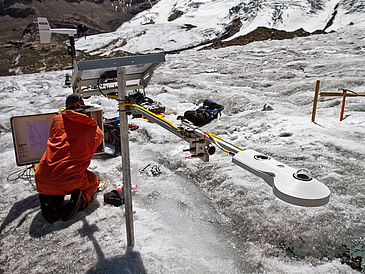By the end of the century the sea level is expected to rise by between 50 and 130 centimeters if there is no worldwide curb on greenhouse gas emissions. That is the prediction resulting from a new study compiled by the Potsdam Institute for Climate Research.
Ben Marzeion, who since September 2015 is a professor at the Institute for Geography at the University of Bremen, was a member of the research team that produced the study. These alarming findings are of such global significance that they recently appeared in “Proceedings of the National Academy of Sciences of the United States of America”. This highly renowned journal published by the US Academy of Sciences is among the most cited in the scientific community – and Professor Marzeion coauthored the article.
Robust risk assessment
The study combines the two most important methods for estimating potential rises in sea level. They are considered as reliable enough to form the basis for a so-called “robust risk assessment”. The scientists involved in the study also employed process-based computer simulations that take account of melting glaciers, the ice sheet’s mass loss, and the thermal expansion of sea water. The latter because, according to the law of physics, warmer water expands and takes up more room. Such simulations are very time-consuming. Alternatively, statistical analyses were also used which are much more straightforward and quicker to apply. The calculation method is more easily reproducible, which made it possible to have a large number of simulation runs to obtain a very probable estimate of how much sea level will rise.
Reducing greenhouse gas emissions is a matter of urgency
The future rise in sea level cannot be broken down in exact figures. It has to be seen as a range that at first may seem rather high. “Calculating this range enables us to make a pretty accurate risk assessment”, says Ben Marzeion from the University of Bremen. “Planners in coastal regions ought to base their predictions both on worst-case as well as best-case scenarios in their opportunities and costs analysis. The world’s best science is now involved in an effort to determine more exactly the range to be expected. In the event the world succeeds in reducing greenhouse gas emissions it may still be possible to prevent a further acceleration of rises in sea level.” However, according to Marzeion, even if the targets agreed at the recent Paris Agreement are met, we can still expect the sea level to rise by between 20 and 60 centimeters.
Sea levels have not risen at such a rate in 3,000 years
In the present context, it is interesting to note the findings of another recently published study: This reveals that over the past three thousand years, sea levels have never risen at such a high rate as in the last hundred.
Vital information for planners in coastal regions
Professor Ben Marzeion studied Oceanography in Kiel and was awarded his doctorate from the University of Bergen in Norway. Now at the University of Bremen, his main research focus is on the effect of glacier melting for regional changes in sea levels. In addition, he is interested in the role glaciers play in the availability of water, which in respect of its importance for local populations varies greatly from region to region. He stresses the social impact of the study’s findings. However, planners in coastal regions will benefit from the study, which will support their decision making on matters like dyke construction and long-term settlement development.
If you would like to have more information on this topic, please contact:
University of Bremen
Faculty of Social Sciences
Ben Marzeion
Professor for Climate Geography
Phone: +49 421 218 67170
email: ben.marzeionprotect me ?!uni-bremenprotect me ?!.de
www.marzeion.info

